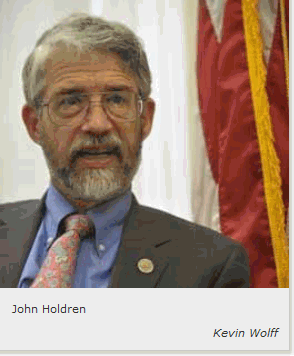|
|
|
|
|
|
|
News & Views item - April 2009 |
![]() US
President Barack Obama's Chief Scientific Advisor Chats With Nature.
(April 9, 2009)
US
President Barack Obama's Chief Scientific Advisor Chats With Nature.
(April 9, 2009)
 John
Holdren, formerly at Harvard University, was confirmed as the director of the
Office of Science and Technology Policy and is US President Barack Obama's chief
scientific advisor.
John
Holdren, formerly at Harvard University, was confirmed as the director of the
Office of Science and Technology Policy and is US President Barack Obama's chief
scientific advisor.
Professor Holdren has now given an extensive interview to the journal Nature.
Here we record several excerpts which we believe are of especial interest when comparing the relationship between Australia's Chief Scientist, Professor Penny Sackett, and our Prime Minister, Kevin Rudd on the one hand to that of John Holdren and Barack Obama on the other, but we also urge you to read the complete interview.
And see also the interview with ScienceInsider.
_______________________________
Nature: Who do you report to on a daily basis
and how often do you speak with the president?
John Holdren: I attend the senior staff meetings every morning in the Roosevelt room, chaired by [White House Chief of Staff] Rahm Emanuel. In that sense, I'm reporting every day in front of the rest of the senior White House staff. We talk about what the president's agenda and priorities for the day are, what all of our offices are doing that matter and what we think the other folks might need to know about.
When I need to see the president, I make a request directly to his scheduler. I don't have to ask anybody's permission to see the president except the president. Some weeks I see him multiple times. Some weeks I don't see him at all. The object of the game, given the premium on his time, is to get as much done below his level as possible and to go to him when you need a decision on something that could not be decided at a lower level.
Nature: What are those interactions like?
John Holdren: He is deeply interested in the science itself. This guy is extraordinary in his capacity to absorb and integrate and synthesize complicated information. His questions are extraordinary.
Nature: The stimulus package, by its very nature, included one-off spending increases that will not be sustained. How do you expect agencies to manage the bump in spending without unsustainable expansion?
John Holdren: This is a really tough one, and I wouldn't pretend to have complete answers... [one] way to deal with it, which the science community hopes for, is to find ways to increase those out-year budgets to the point that they don't suffer a decline. That's going to be very hard in the current economic climate.
Nature: [W]hat are your priorities when it comes to the spread of nuclear energy and counterbalancing non-proliferation programs?
John Holdren: I think we ultimately ought to look to put all uranium enrichment and fuel reprocessing, if any is done, under multinational control.
Nature: President Obama said in his inaugural speech
that he wants to "restore science to its rightful place". What is that place,
and what would count as a clear sign that science has been restored to it?
John Holdren: I would say the first sign is the appointments he has made. He has put real scientists in positions of real influence. The second thing is the scientists are at the table. We are at the table in every dimension of national policy where science matters, and that is most of them. We have access to the president. We have access to the national security advisor. We have access to the Treasury. This president understands the importance of science and technology to all of the challenges we face, and so he means to have the science and technology advice he needs.